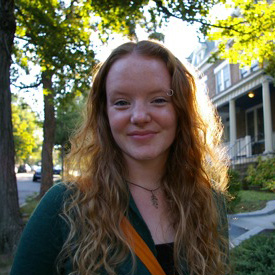Perennials
Outside, my mother sculpts and preens her garden,
spreading russet mulch beneath the splayed clematis,
plucking cypress needles from the tigerlilies’ bed.
The sun begins to set, and the light sweetens.
She leaves her thin yellow flip-flops by the back door,
opens a bottle of beer and pours half into a glass
on the kitchen table, where it waits for me,
perspiring beside a ball of soft pink petals,
a hydrangea blossom too heavy for its stem.
We listen to Lou Reed and the sizzling onions,
snapping green beans into a colander between us,
and she tells me about annuals and perennials,
how tulips and crocuses keep promises each spring.
When it is time to call the others to the table,
I linger for a moment beside the pantry window.
Dusk fallen, my mother is on the patio again.
She coils a hose beneath the rosebush,
splashes the earth to ensure next year’s beauty,
a few petals wet and clinging to her hands.
The Rhodesian Ridgeback with Melanoma
Two brothers fly home from the west coast
to see their dog one last time, her haunches sharp
though her belly hangs soft and full.
She follows parallelograms of sun
around the house, accepts gifts of sausage
and yogurt from the boys’ mother, pants
softly in her sleep.
Perhaps they would try radiation and chemo
if she were not already old for her breed,
or if they did not know she might
die anyway. For nine years she
reminded the boys of the time between
their father’s life and the present—
her puppydom the light
of their darkest days;
her tall, sleek body the spirit
of the fatherless half of their lives.
The mother rolls up rugs around the house
and lays newspaper, writes emails
listing the results of blood-tests, but cancels
the ultrasound—she knows everything
she needs to know. For the second time
in a decade, cancer lays a blanket
over her home. She pulls the dog’s bed
beside her own and waits
for the fateful night when they will wake
from their clouded dreams, when
they will all let go.
How to Leave the Town Where You Fell in Love
Leave in the dead of winter, not this breezy August morning with light leaking into the yard like spilled gold. Remember the dark curtain that falls on winter afternoons, dull gray snow in icy mounds through May.
Learn not to get so sentimental next time. Remember men at the coffee shop with only a few fingers left, the factory shooting on the edge of town, the strip mall that stretches its clumsy limbs between here and anywhere else.
Forget the blue Schwinn with the dipped bar, cotton skirts flapping against your knees on the ride to work. Remember the bakery's stiff heat, curls stuck damp to your neck. Sweat running down the insides of your legs. The thin veil of flour pressed like powder to your face.
Forget propping the pub door open with a folding chair, drinking dollar drafts at five, sweet light in a dusty shafts. The cool dark booth. Evenings spent riding along the canal, your laughter scattering geese.
Or washing vegetables at the kitchen sink, just last night, while shadows thickened against the shed. Someone was singing, hanging laundry on the line, wires creaking under the weight.
It is best this way, you must tell yourself. The love will come along, sit beside you as you drive, one hand on your leg, the highway watery with heat.
Whatever you do, do not return. This yard, with its cool fire, crickets lit like sparks in the light, will not belong to you. Soon, the sodden cloak of winter and forgetting will render it unknown.
